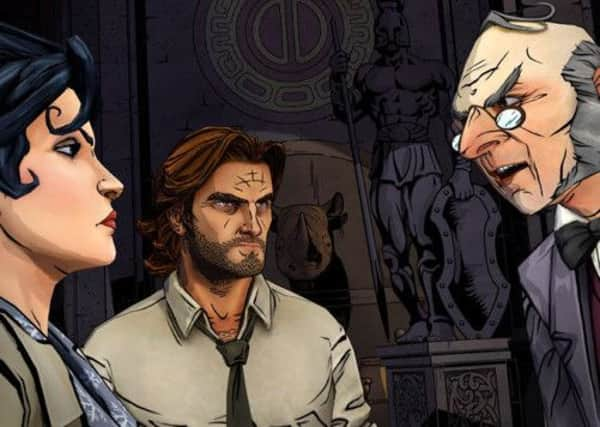Scotsman Games review: The Wolf Among Us, Xbox 360


The Wolf Among Us - Xbox 360 (reviewed), Playstation 3, Windows, Mac
Score: 8.6/10
Predating the first issue of the Vertigo strand by two decades, it is billed as “a piece of untold story canon” designed for those unfamiliar with the 56-year-old’s work. Centring around a community of Fables - iconic figures plucked from mythology, legend and fairy tales - who are placed in a contemporary neo-noir setting, it is akin to an alternate screenplay for Sin City as written by Lewis Carroll.
Advertisement
Hide AdAdvertisement
Hide AdThe game is the latest example of Telltale Game’s intuitive episodic adventures concept which reached its apogee with the California publisher’s outstanding five-part adaptation of The Walking Dead. In the same way that title perfectly complemented the survival horror comics and television series, The Wolf Among Us is a gripping accompaniment to Willingham’s artistic narratives. Having suffered the halfhearted groping of Hollywood executives intent on transporting his books to the big screen, the author clearly regards Telltale as his kinsfolk, remarking of the game: “It’s brilliant to the point of there being far too many moments of ‘I wish I’d thought of that’.”
The inaugural episode, Faith, revolves around the morally imbalanced protagonist of Sheriff Bigby Wolf - aka the Big Bad Wolf - a Fable with a chequered past charged with maintaining peace among his fantastical peers as they eke out a living alongside ordinary citizens, known as Mundies. The instalment revolves around a series of murders, with the player asked to take the reins of Bigby’s passive-aggressive personality in order to solve the mystery.
The dialogue - always a highlight of the publisher’s games - is consistently excellent. The choices are varied and depending on any number of ripostes or discreet silences, the fate of Bigby and his fellow Fables feels as if it is in your hands. Only future episodes, of course, will reveal the wisdom of the choices made - the majority of your time in Faith is an exercise in exposition, spent prowling rooms and locales for clues. On occasion, this becomes a cumbersome join the dots affair, but it is a task held together by the glue of the murky backstory as it unfolds satisfyingly with every discovery.
Several times in episode one, these contemplative pursuits are shattered, and the game explodes into life with action sequences. These bursts of activity see Bigby embark on frenetic pursuits down dank alleyways, or roll up his sleeves for savage fights in downtrodden bars and dimly-lit apartments. Similar to the reticle mechanism employed in The Walking Dead, players must pass a test of nerve and co-ordination, responding to on-screen prompts with a shift of a thumbstick or a pull of a trigger at a moment’s notice.
The frenzied pace of these quicktime action proceedings means it can be hard to know if you have mashed the joypad with any accuracy, leave a lingering feeling that your input is not altogether vital to a scene’s conclusion. Thankfully, these doubts are assuaged by some spendidly creative choreography. Bigby does not only rely on his fists, but will happy mete out punishment with any item or fixture close to hand. The result is always riveting, and at times downright ruthless.
Telltale does not rely on violence alone to gleefully subvert the preconceptions of characters who are part of our collective childhood. Within a few minutes of loading the game, it is evident they have followed the old screenwriting adage of ‘Show, don’t tell’. One of the three little pigs, for instance, is vividly painted as a chain smoking idler with a weakness for the sauce, while Mr Toad is a grubby, feckless landlord with a vocabulary so colourful it would make a Glaswegian welder blush. The cast of these oddities is an undoubted highlight of The Wolf Among Us, with the voice actors - Adam Harrington as The Woodsman in particular - lending Willingham’s creations another dimension.
Artistically, too, the game is a tonal triumph. David Bogan’s art direction does not try to imitate the graphic novels, but borrow their characteristics and mould them into an alluring animation style. The scenes are bursts of neon and grey, and the cell-shaded locations are mesmeric. Unfortunately, the framerate does not always do them justice; in the review build, the action frequently reduced to a stutter, spoiling the illusion somewhat, although minor tweaks have been promised to address performance issues.
As a taste of what is to come, A Wolf Among Us is a delectable entrée. Telltale have rightly won a legion of fans for their output in recent years, and although their latest title does not represent an evolutionary leap in terms of game style, it is sufficiently distinct from The Walking Dead’s dread-laden narrative of survival. Once again, the company have offered up a fine example of how the interactive story medium can soar to giddy heights when it is fused with compelling source material. Take the advice of W.H. Auden: “The way to read a fairy tale is to throw yourself in.”